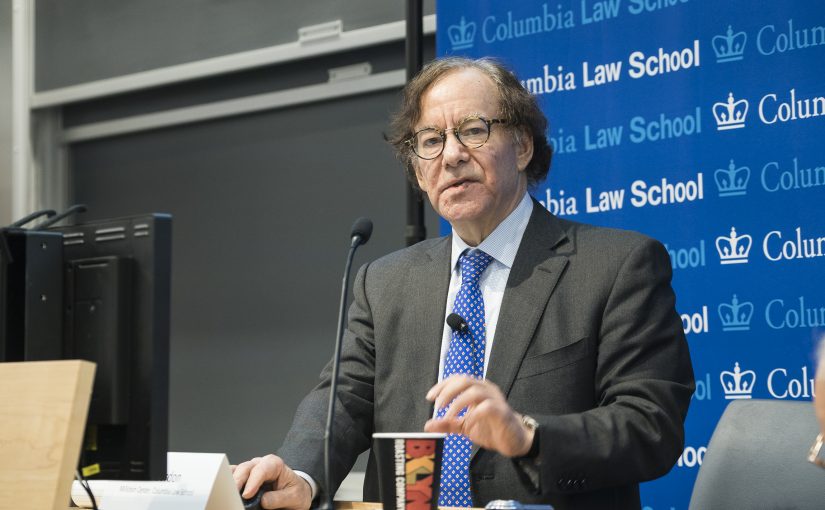Editor’s Note: This post is part of an ongoing multi-part series covering the Millstein Center’s March 1, 2019 conference, “Corporate Governance ‘Counter-narratives’: On Corporate Purpose and Shareholder Value(s).”
By Brea Hinricks
Professor Jeff Gordon presents his argument for addressing the economic insecurity faced by today’s employees—a robust government investment program in human capital to subsidize employee retraining and reeducation.
Capitalism and corporate purpose have evolved over the last half century to become increasingly and more narrowly focused on profits and shareholder value. The Friedman Doctrine has firmly taken hold. At the same time, the rise of global product and capital markets have subjected firms to increased competitive pressures, and domestic disrupters in the U.S. such as Walmart, Amazon, Netflix, and the large tech companies have transformed entire industries and resulted in a more dynamic and less predictable domestic economy. The rise of asset managers and index funds have allowed shareholders to hold globally diversified equity portfolios at a low cost. A “high-powered” corporate governance regime has emerged in which managerial performance is closely monitored through shareholder value metrics, and activists tolerate only minuscule amounts of slack. Firms are encouraged to engage in more risk-taking and less diversification of cashflows at the firm level (which is inefficient given shareholders’ diversified portfolios across firms), resulting in shorter company lifespans.
This is the picture Professor Jeffrey N. Gordon painted in his remarks at the Millstein Center’s March 1, 2019 conference, Corporate Governance “Counter-narratives”: On Corporate Purpose and Shareholder Value(s). (His ideas are discussed more fully in his paper prepared for the British Academy project on The Future of the Corporation, Is corporate governance a first-order cause of the current malaise?, and you can find a recording of his remarks at the conference here.) The most important consequence of these corporate governance changes, he says, is the shift of risk of economic change from shareholders to employees. Employees can no longer count on working for a single firm for their entire careers, supported by robust insurance packages. Today’s firms are much more likely to engage in layoffs to reduce slack and more likely to fail to survive altogether. Due to technological change and the shifting nature of work, many workers’ skills are quickly becoming obsolete. While shareholders have enjoyed increased security and financial gain thanks to their globally diversified portfolios (leaving them concerned only with systemic or global risks), employees are not easily able to diversify against firm-specific risks. When workers lose their jobs, they lose not only their source of income but also their access to our system of welfare and insurance, which is largely provided through the workplace.
One proposed method of addressing rising economic insecurity, posited by Colin Mayer, focuses on firm-level corporate governance: corporations should be required to commit to a corporate purpose broader than mere profits, and they should be required to measure profits net of expenditures of human (as well as natural and social) capital. Similarly, the creation of human capital and these other forms of capital should be rightly recognized and recorded as assets. These changes, under Mayer’s theory, would incentive companies to increase investment in their employees.
However, given the global trends and competitive pressures that companies face, which are largely exogenous to individual firms, Gordon points out that the role of corporate governance in creating economic insecurity should not be overstated. Individual firms in this broader environment, he argues, are simply not able to provide the sort of “thick” insurance that employees need to bear the risks which have shifted onto them (even if companies were sufficiently incentivized to do so).
The solution, Gordon argues, is to look to government subsidy to provide a new kind of insurance. He calls for a ‘match’ between the government and private sector enterprise that would act as a ‘public endowment’ in human capital. It would subsidize retraining and reeducation of employees and provide them with the career agility needed in today’s quickly changing, unpredictable world of work. To fund this increased government investment, Gordon says we should look to the gains created by the efficiencies of today’s firms managed for maximum competitive advantage (which are currently flowing to shareholders, but not to employees).
Increased investment in human capital by the government is necessary not only to benefit employees, but also to serve the national economic interest. Gordon points out that as economic insecurity and inequality escalate, political frictions are intensifying. Political instability, in turn, poses uncertainty and the threat of systemic risks, which have negative impacts on the entire economy—not even shareholders’ diversified portfolios are safe. This point leads Gordon to an interesting insight about would-be champions of his proposal: he argues that rationally-thinking asset managers, given their interest in increasing expected returns across the entire economy and avoiding systemic risks, should be on board with government provision of this type of insurance.
Attendees at the conference expressed some critiques of Gordon’s ideas. Primary among them was the issue of political feasibility and the real-world political behavior of the business community. After all, one commentator pointed out, the business community (which has significant political influence) resists regulation, increased government spending, and increased taxation at every turn, even if in theory these things could serve their self-interest. Gordon agreed, but responded that in today’s political environment, which at least in discourse is entertaining drastic reforms such as the Green New Deal, the business community may be receptive to what they view as less “radical” alternatives. Another attendee drew attention to the fact that government subsidized reeducation and retraining may cause a moral hazard problem in which companies are even less timid about laying off employees, and in which they may even be incentivized to do so.
Despite the potential challenges of implementing Gordon’s proposals in practice, it is important to continue the conversation around these ideas to address the ongoing problems of economic insecurity, inequality, and slow economic growth, and to identify the appropriate balance between shareholder interests and the interests of broader stakeholders (and government’s role in finding that balance). The Millstein Center looks forward to continuing to explore these ideas through our Counter-Narratives Project.

